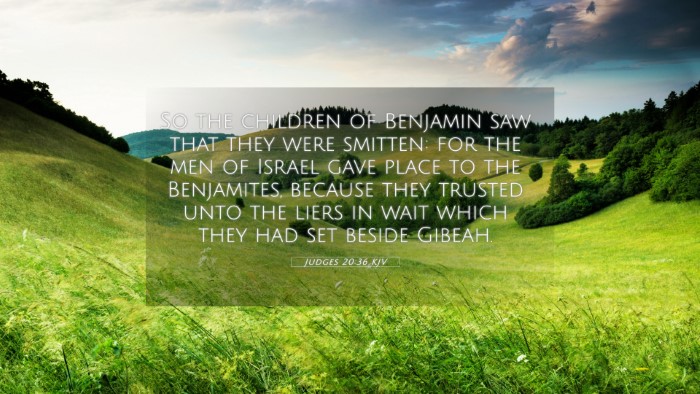Understanding Judges 20:36
Judges 20:36 states, "So the children of Benjamin saw that they were smitten: for the men of Israel gave place to the Benjamites, because they trusted unto the liers in wait which they had set." This verse comes from a tumultuous period in Israel's history and reflects the intense conflict between the tribe of Benjamin and the other Israelite tribes.
Exegesis and Commentary
The insights from various public domain commentaries provide a deeper understanding of this verse:
- Matthew Henry: Henry highlights the strategic warfare of the Israelites against their brethren, illustrating the folly of trust in deceptive tactics. The verse signifies how the Benjamites felt encouraged by their initial successes, only to be caught in their own trap.
- Albert Barnes: Barnes emphasizes the significance of the 'liers in wait' as a military tactic. The verse conveys a dual meaning of strategy and betrayal, where one side's false confidence was rooted in their underestimation of the enemy's cunning.
- Adam Clarke: Clarke reflects on the moral implications of this conflict, noting the tragic fall of a tribe within Israel and the consequential loss of life, thereby bringing a poignant climax to the internecine struggle.
Bible Verse Cross-References
This verse connects to several other passages that inform its meaning:
- Judges 20:29: Discusses the Israelite strategy by surrounding Gibeah.
- Romans 12:21: Offers an exhortation on overcoming evil with good, contrasting with the violent actions depicted in Judges.
- 1 Samuel 15:23: Speaks about rebellion as the sin of witchcraft, which resonates with the deceptive tactics employed by the Benjamites.
- Proverbs 1:18: Talks about the dangers of a violent ambush, drawing a parallel to the strategic deception in the battle.
- Jeremiah 9:4: Insights about deceit among one's own people and the need for vigilance.
- Matthew 10:16: Jesus advises being wise as serpents and innocent as doves, akin to the need for discernment in conflicts.
- Ephesians 6:12: A reminder that battles are not merely physical but spiritual, providing another layer of understanding to conflicts like that in Judges.
- Galatians 6:1: Consideration for how to restore a brother caught in sin, reflective of the internal conflict in Israel among tribes.
- Luke 14:31: Jesus mentions a king contemplating war, which resonates with the deliberation of Israel before engaging Benjamites.
- Proverbs 18:9: Relates to the folly of laziness and its consequences, paralleling the complacency in spiritual warfare.
Thematic Bible Verse Connections
Judges 20:36 carries themes of conflict, betrayal, and divine justice:
- Conflict: The struggle between the tribes exemplifies internal strife within the body of believers.
- Betrayal: The deceitfulness present in the conflict raises questions about loyalty and trust among God's people.
- Divine Justice: The consequences faced by the Benjamites denote the overarching theme of God's judgment against sin.
Comparative Bible Verse Analysis
By cross-referencing Judges 20:36 with other Biblical texts, we draw meaningful parallels:
- Judges 20:29 gives context of strategic warfare.
- Matthew 10:16 reflects on the wisdom needed in conflict.
How to Use Bible Cross-References
Using cross-references can enrich one’s understanding of Scripture:
- Utilize a bible concordance for detailed study.
- Consult a bible cross-reference guide for thematic analysis.
- Engage in cross-reference Bible study methods to see connections.
Conclusion
Judges 20:36 invites readers to consider the implications of conflict within community and the consequences of trusting in deceitful strategies. Through comprehensive Bible cross-reference materials, one can glean wisdom and insight from a broader contextual framework, enriching their understanding of God's word.
This analysis illustrates that through thematic connections, comparative studies, and scriptural dialogues, we can better interpret the weaving of narratives and lessons in Scripture.



